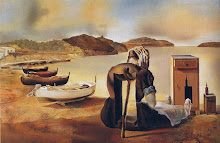One of the big questions for us in Midian is whether or not we are "good people." In the banal drudgery of the everyday, we often make choices for a variety of reasons. Sometimes we fork left because it is the "right thing to do;" other times we fork right because "it's just not worth it." Indeed, if character is defined by the choices we make, then the population of Midian is an incredibly mixed bunch with a pretty unpredictable morality.
In Midian, there are a lot of "virtues" to choose from...and many of them are in opposition to one another. Sometimes passive humility is a virtuous response; other times speaking up with strong devotion is the best way to go. Sometimes caring support is needed, other times, people require "tough love." Stuart Hampshire, in his Two Theories of Morality (Oxford University Press, 1977), states that:
The ways of life which men aspire to and admire and wish to enjoy are normally a balance between, and combination of, disparate elements; and this is so, partly, because human beings are not so constructed that they have just one overriding concern or end, or even a few overriding desires or interests. They find themselves trying to reconcile, and to assign priorities to widely different and diverging and changing concerns and interests, both within the single life of an individual, and within a single society.
What this means, of course, is that we're all guilty, to some degree, of moral relativism. Even those who stoically focus on the "virtuous life" are bound to be caught up in hypocrisy eventually. Jesus notes this tendency when he speaks to his followers about the Pharisees:
Matt 23:1-6
1 Then Jesus spoke to the crowds and to His disciples, 2 saying: "The scribes and the Pharisees have seated themselves in the chair of Moses; 3 therefore all that they tell you, do and observe, but do not do according to their deeds; for they say things and do not do them. 4 "They tie up heavy burdens and lay them on men's shoulders, but they themselves are unwilling to move them with so much as a finger. 5 "But they do all their deeds to be noticed by men; for they broaden their phylacteries and lengthen the tassels of their garments. 6 "They love the place of honor at banquets and the chief seats in the synagogues, 7 and respectful greetings in the market places, and being called Rabbi by men.
The Pharisees suffered from a particularly vicious error in judgment; they were so committed to the letter of the Law that they refused to take a step back and see other peoples' needs, as well as their own weaknesses. Jesus convicts them of being incredibly well-educated on virtues, but, simultaneously being of extraordinarily weak character. Knowledge of, and concentration on, virtues does no good if one does not possess character. Stanley Hauerwas, one of the great modern Christian ethicists, notes this requirement in his The Christian Life, namely that:
"..we often find ourselves involved in ways of life that require that certain virtues go undeveloped or be essentially transformed. We cannot depend on "the virtues" to provide us with a [self-sufficience necessary] to give us the ability to claim our actions as our own. Rather, virtues finally depend on our character for direction, not vice-versa."
As we clumsily strive to live up to a set of virtues, we have to realize that this struggle to conquer our personal demons and hypocrisy builds character. Even when we fail to live in a way that makes us proud, those failures can become building blocks in the foundation of our character. When we ignore those conflicts and just "go along" with whatever society or particular people tell us is correct, though, we corrode that foundation and make it even more difficult to live a virtuous life.God gave us the gift of self-awareness so that we could take a step back and examine our lives and the choices we are making. Ultimately, developing a code of "do's" and "do-not's" is not nearly as important as growing from the ethical conflicts in our lives. Of course, He has also given us the Holy Spirit so that we might not have to go through these conflicts alone.
As Christ continues to mold us in Midian, we can't disengage from the necessary ethical choices we must make; but, we also can't lose hope when we fail to live a perfect life.


No comments:
Post a Comment